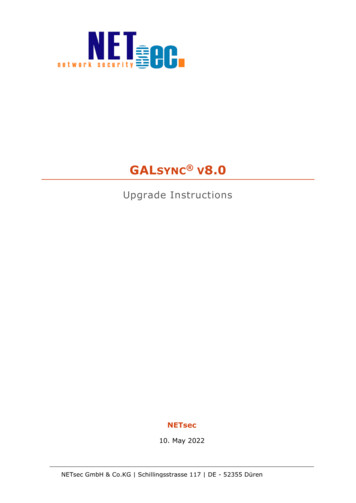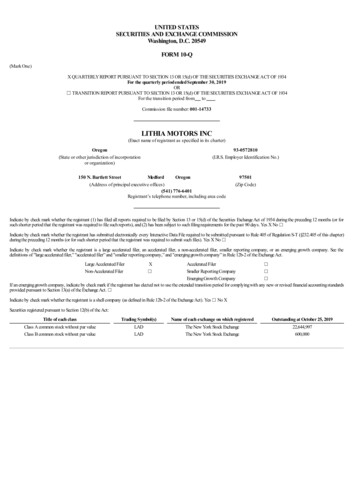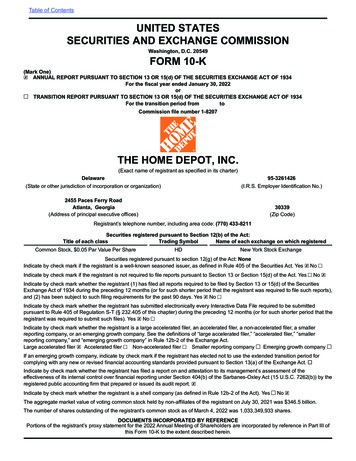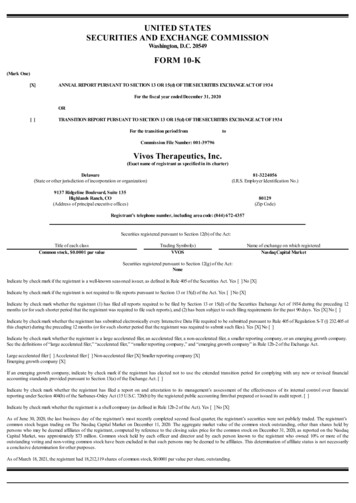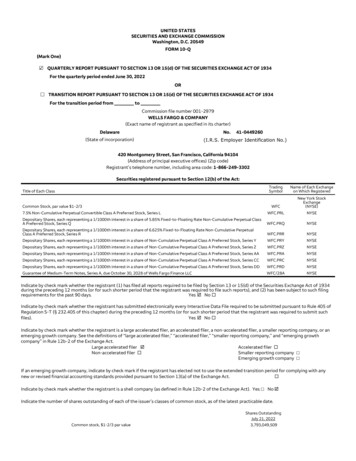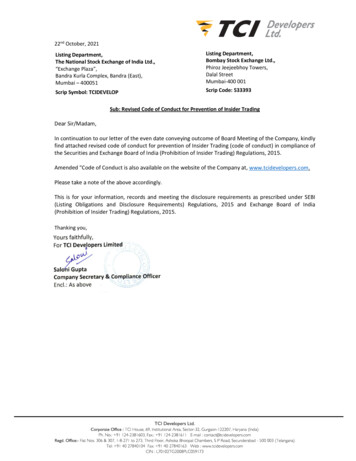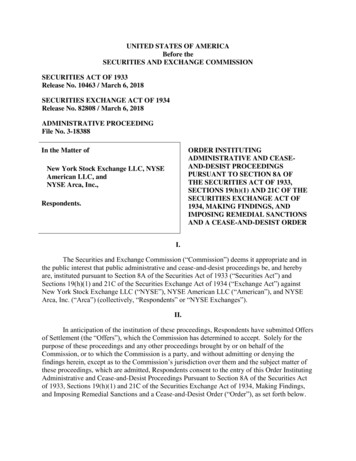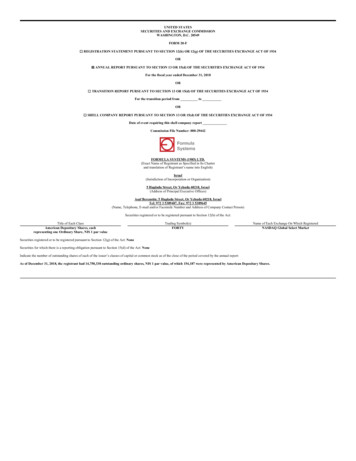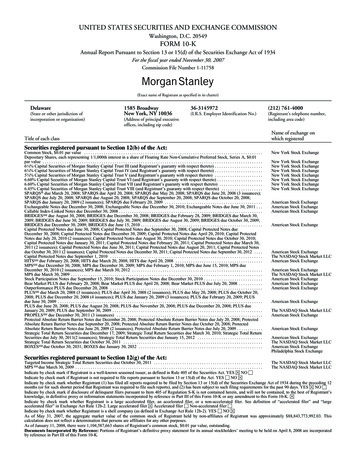
Transcription
STATEMENT OF GAYLEN R. HANSEN, NASBA DIRECTOR-AT LARGEU.S. SECURITIES AND EXCHANGE COMMISSIONROUNDTABLE ON INTERNATIONAL FINANCIAL REPORTING STANDARDS IN THE U.S.JULY 7, 2011I would like to thank the Office of the Chief Accountant for the invitation to participate in thisRoundtable.As you are probably aware, accountancy regulation in the U.S. is separate and apart from professionalassociations, which is not the case in much of the world. In addition to the PCAOB, SEC and otherFederal agencies, we have 55 State regulators. These State Boards are all members of the NationalAssociation of State Boards of Accountancy (NASBA), and collectively oversee the largest group oflicensed accounting professionals in the world – over 650,000. State Boards of Accountancy arelegislatively mandated, statutorily chartered and work closely with the profession to protect the PublicInterest. So it is fitting NASBA, on behalf of our 55 State Board members, has been asked to address thekey issues discussed here today. More about State Boards and NASBA is included in the Appendixposted online.INTRODUCTIONTo be clear, NASBA supports the concept of high quality global accounting standards. However, like thebeauty pageant contestant hoping for “world peace and harmony”, support of a good idea is one thing,making it happen is quite another.The case must be made that IFRS is not only a good idea, but is significantly better than what we alreadyhave. As regulators we have a responsibility to ask, “What is in it for us? What are the risks?”Considering the significant risks, the rewards must realistically offer superior and achievable benefits.Most importantly, we expect any change to clearly be in our National Interest.1To date, the case has NOT been made for IFRS. Accordingly, consistent with the observations in our2009 Comment Letter on the 2008 Roadmap,2 we believe the Staff should reconsider its 2010 Work Planas well as its May 2011 “Condorsement” proposal.I will elaborate, but will first note NASBA has nothing to sell, no fees, cost savings, credentials, books orCPE courses by which it would profit if IFRS is adopted. We are not vested in IFRS one way or the other.Careers at NASBA and State Boards are not dependent on IFRS going forward or being delayed. Ourposition is based solely on the National Interest.So far we have witnessed considerable focus on the tactical “How and When” questions to get us toIFRS. Unfortunately, this passion ignores the gorilla in the room, the strategically more relevant1PCAOB Board Member Charles D. Niemeier, September 10, 2008 speech to the New York Society of 0 Niemeier.pdf2NASBA, February 19, 2009. File Number S7-27-08 “Roadmap For The Potential Use Of Financial StatementsPrepared In Accordance With International Financial Reporting Standards By U.S. 708-47.pdf
question of “Why” we are even considering IFRS in the first place. While I cannot address all of ourconcerns in the time allotted, there are three broad areas worth reviewing.DISCUSSION1.The case has NOT been made that IFRS is better than U.S. GAAP. IFRS is the new kid onthe block; consequently the burden of proof is on those advocating it. To this please refer to astudy by Professor Donna Street and published in June 2011 by the Council of Institutional Investors.3IFRS must stand on its own merits but the notion of one universal GAAP is largely a myth. There areactually numerous versions. It has been hyped that over 120 countries worldwide have adopted IFRSissued by the IASB. This is simply not true - - carve-outs resulting in jurisdictional versions are legion.In reality, U.S. GAAP may be much closer to IFRS today than IFRS in many countries claiming adoption. Ihave spoken to Canadians who have indicated some of their companies are not doing anything otherthan wrapping the IFRS name around Canadian GAAP. The same has been previously reported aboutFrance. The crux of this may be that “high-quality” has yet to be defined in a context that is meaningful.With an endorsement strategy, the SEC has come full circle from insisting on an IASB as issued version tonow embrace a U.S.-flavored IFRS, with only a weak hope there will be few differences. There is nobasis for such optimism considering the SEC has issued over 100 Staff Accounting Bulletins, a lengthyFinancial Reporting Manual and its speakers regularly interpret GAAP at various conferences. These arerequired now by the SEC with a domestic private-sector standard setter. What will happen when aforeign de-facto standard setter is calling the shots is pure conjecture.One may ask how many versions of GAAP do we need or even want.4 There is the plethora of IFRScarve-outs around the world already. The U.S. may go to one for large companies, perhaps another forsmaller companies, the IASB version for Foreign Private Issuers, and potentially another for privatereporting. Woe to the poor souls reconciling contracts or loan covenants requiring GAAP compliance.Like the Canadians and French, just because we may want to call IFRS “GAAP,” that doesn’t make it so.However, some legal clarity is needed to figure out whether some or all vintages of IFRS legallyconstitute “GAAP.”GAAP could mean literally anything when the standards are moved around like a Rubik’s Cube. We haveserious concerns the plan put forward to “condorse” IFRS will cause confusion and loss of investorconfidence. This will happen whenever there is more than one version of whatever one calls GAAP.3Donna L. Street, University of Dayton, Criteria for an Independent Accounting Standard Setter, How Does the IASBRate?, Council of Institutional Investors, June 20FINAL.pdf4In a June 29, 2011 speech of SEC Commissioner Casey in Colorado Springs, Casey justifies a “two-GAAP” world bynoting the Commission already permits foreign private issuers to use IFRS. This comment is disingenuous: theprior Cox SEC administration made the serious mistake of opening Pandora’s Box with its 2007 decision to acceptIFRS from foreign private issuers. The mistake does not justify geometric compounding of the same 11klc.htmPage 2
While admittedly, endorsement is better than outright replacement of GAAP, the original dream ofcomparability seems to have taken a back seat to the real agenda of some promoters – to get to IFRS atany cost and to pacify our friends abroad. Unfortunately, on this front, the U.S. overcommitted itselfearly on with various “Memoranda of Understanding” thereby subordinating the National Interest to afoggy notion of what may be perceived as a Global Interest. There is a major distinction. A GlobalInterest is not necessarily in our National Interest.5When it comes to the driver of standards in this country, for too long we have looked primarily to thesuppliers of financial reporting rather than the needs of users, especially investors. I have read the 200plus comment letters sent to the SEC on the 2007 Roadmap. Despite the spin of overwhelming supportfor global standards, there is actually substantial concern and much outright opposition.6I have never had a lender or investor request international standards. I have never even heard of suchpleas. On the contrary, the call for IFRS always seems to be from the suppliers, primarily largemultinationals and international accounting firms. It is often trumpeted that the G-20 is calling for IFRS.We submit that a couple of cryptic sentences in the 14th recommendation near the end of theirpronouncement do not alone give any compelling reason why IFRS is critical to the world economy.At this Roundtable there is not a single small issuer without international dealings. The group heretoday is not representative of the majority of small issuers. What is in IFRS for the small, purelydomestic issuer – the mining company, restaurant chain or startup – and what are their concerns?Without resources to write comment letters, these folks are too busy just trying to survive. Before theSEC makes its final decision, it is critical we hear from those otherwise presumed to have nothing to say.This may mean more innovative outreach efforts are needed and appropriately filtered for bias.Our system is significantly different than the rest of the world. We have different enforcement,educational, and licensing regimes. In our public markets there is a much higher level of personalinvestment and a performance emphasis. Our regulatory instincts are investor-focused. In manycountries investors are secondary to business, which has a much greater say about standards.Stewardship is their main concern rather than performance. Abroad there is a hit and miss approach toregulation -- and very little approaching our SEC and State Board models. What little regulatory5The Federalist Papers, particularly Jay in No. 4 and Hamilton in No. 11. “But whatever may be our situation,whether firmly united under one national government, or split into a number of confederacies, certain it is, thatforeign nations will know and view it exactly as it is; and they will act toward us accordingly. If they see that ournational government is efficient and well administered, our trade prudently regulated, our militia properlyorganized and disciplined, our resources and finances discreetly managed, our credit re-established, our peoplefree, contented, and united, they will be much more disposed to cultivate our friendship than provoke ourresentment.” (Jay No. 4)6Tom Selling, The Comments on the SEC Roadmap are Clear: Make a U-Turn, The Accounting Onion, July 20, re-cleartake-another-route.htmlPage 3
oversight that does exist caters more to aid local businesses in the global marketplace.7 8 Thus, there aresome fundamental structural distinctions that cannot be overcome simply with accounting standards.The regulator constituency is far different outside our borders. We should recognize this in any questfor comparability.Finally, IFRS has been “sold” based on the unfounded hyperbole it is better because it is principlesbased. This assertion is patently false. There are principles and rules in both U.S. GAAP and IFRS.Professor Lawrence Cunningham has written extensively about this sales pitch.9 There are indeedsignificant risks of over-emphasizing all things supposedly “principled.” Management has demonstratedrepeatedly, when allowed free reign to exercise judgment, there will be increased pressure on detectionrisk and external auditors.102.Governance of the IASB must be fundamentally sound. The Staff has rightly indentifiedthis as a significant issue. Although the endorsement approach may bypass some legal concerns, even ifthe FASB becomes a proxy for the IASB, the result will be the same. The IASB has to be trulyindependent, financially11 and politically. It must be transparent and responsive to its constituency. TheMonitoring Board was established to answer these concerns. However, its infrequent meetings andcomposition of national regulators accountable solely to their own employers, do not constitutemeaningful oversight. True independence of the IASB must be addressed before a serious adoptionplan can be put forward.National sovereignty in standard setting weighs heavily in protection of our National Interest. However,sovereignty must also be considered in light of States’ Rights. State Sovereignty extends to each of our55 State jurisdictions as it relates to private reporting. The Roadmap and Work Plan correctly identifythe impact of IFRS adoption on private reporting as an issue; however, little about this has beenexplored to date. Would the FASB remain as a robust standard-setter or would it be diluted to becomea mere rubber stamp and go-between for the IASB?7This was widely reported in October 2008 when the IASB by-passed normal due process policies to rush to the aidof European banks. The outcome was not based on sound standard-setting procedure but solely in response topolitical pressure and appeasement of business interests. It was reported the IASB Chair threatened to resign butdid not.8Another example is the transparency emphasis in the U.S. in recent years. By comparison, the IASB has hadsignificant struggles convincing its constituency about the importance of accounting for derivatives and reportingof segment information.9A Prescription to Retire the Rhetoric of “Principles-Based Systems” in Corporate Law, Securities Regulation, andAccounting, Lawrence A. Cunningham, Vanderbilt Law Review, Vanderbilt University Law School, October ct id 97064610For example, under IFRS there is considerable leeway for management to choose when and how to write-upassets and capitalization of intangibles and research and development expenses.11See on page 13 from above Criteria for an Independent Accounting Standard Setter, noting that the 2011 IASBbudget plans on less than half of its funding from publicly sponsored/nationally administered financing, 26% fromaccounting firms and 8% direct voluntary contributions. By contrast the FASB is now substantially financed as aresult of the accounting support fees under the Sarbanes-Oxley Act.Page 4
It is clear an IFRS model in the U.S. will be a baseline for private financial reporting by private companiesconstituting a critical source of job creation, employment and GNP. We repeat that States do havesovereignty in this area and this fact is clearly acknowledged in the Sarbanes-Oxley Act.12Also from a sovereignty standpoint, it would be helpful if those regulators vested with a voice in privatereporting be included in the SEC’s ongoing discussion agenda. This would be consistent with andresponsive to the ACAP recommendations.133.Costs need careful consideration and must be reasonable. While this has been identifiedas a concern by the Staff, very little has been done to actually address the issue. Some believe the costwill be staggering and easily exceed by several magnitudes the costs of adopting Section 404 ofSarbanes-Oxley.14 What is the cost likely to be and who is going to bear the burden? While conversioncosts of the largest issuers may be offset by benefits accruing directly to them, by comparison from apercentage standpoint, the cost will be incredibly greater to the small issuer with virtually no benefit.15Ironically, at a time when the country is struggling financially, to place this additional burden on thebacks of small business is unreasonable and certainly not equitable. Further, the cost of training will bepervasive and extend to all sectors of the financial reporting community, including users, regulators,academia, and the public at large.As it relates to the accounting profession, the IFRS proposal heavily favors the largest auditing firms atthe expense of small practices. There has been a long and storied history of concentration within theprofession and a lack of competition. This has been exacerbated in recent years and has been thesubject of significant national and even international concern.16 Essentially, going to multiple versions ofGAAP will create a community of CPA firm “haves and have not’s.” Small firms simply do not have theresources to support multiple versions of GAAP. This is not healthy for the nation, nor the profession,and certainly not for the investors.12Sarbanes-Oxley Act of 2002, Section 209, also mentioned in Sections 104 and 105.We note a recommendation in the 2008 U.S. Treasury Department’s Advisory Committee on the AccountingProfession (ACAP), to “require regular and formal roundtable meetings of regulators and other governmentalenforcement bodies in a cooperative effort to improve regulatory effectiveness and reduce the incidence ofduplicative and potentially inconsistent enforcement regimes.” To date such meetings have not s-releases/Pages/hp1158.aspx14For example see comment letter dated January 28, 2009, to the SEC from James F. Barlow, Senior Vice President,Corporate Controller, (Principal Accounting Officer), Allergan, Inc. 5The only substantive benefit for small domestic issuers is a lower cost of capital. However, given that the U.S.already has the lowest cost of capital in the world (argued by Niemeier in his speech noted above), how does IFRSimprove an incentive that is already satisfied by U.S. GAAP?16For example, the 2008 ACAP hearings identified concentration and competition as a serious threat. In a similarvein, in late 2010, the European Commission issued a Green Paper on the topic and is now exploring the sameissues. http://ec.europa.eu/internal market/auditing/docs/liability/700996 en.pdf13Page 5
CONCLUSIONInternational standards may be likened to the Holy Grail, worth searching for but only if you think thereis a reasonable chance of finding it. In the meantime, there is a real risk of obsessing in the quest at theexpense of more pressing and worthy goals. There are extremely high risks in the “condorsement”approach suggested by the Staff. We may not know for several decades whether it was a very bad ideaand, if so, in time to recover.We strongly support continuation of the FASB as constituted in its present form. With regard toembracing IFRS, this is best undertaken through convergence when appropriate, subject to legal dueprocess, but only based on a consistent and logical theoretical foundation. Convergence simply for thesake of convergence is not a good idea. Further, convergence based on compromise representsacceptance of mediocrity, inconsistent with any claim to high-quality standards.The FASB should not become a mere conduit to import IASB standards. We understand theendorsement approach is being considered as a matter of convenience because the SEC cannot concedeor delegate its oversight role. However, endorsement will not lead to comparability nor high qualitystandards, but instead carve-outs and cut-ins. We fear endorsement will be tantamount to surrender ofinvestor protection. Once such an arrangement is set in motion, it will be nearly impossible to reverse.Any arrangement involving the IASB should not be considered until all U.S. stakeholders are satisfiedwith IASB independence and governance. Further, the cost of embracing IFRS should be thoroughlyvetted before any further commitments to the IASB are made or even implied. In all instances bothNational and State Sovereignty must be respected.A beauty contestant’s naïve quest for a world of peace and harmony is understandable, even admirable.However, weakening oversight of our own standards is neither, and is clearly not in our NationalInterest. Why we would impose this upon ourselves, without compulsion, is even more remarkable.We recognize the current debate was not the making of the current Commission or Staff. You are to becommended for giving the project your good faith efforts. Again we ask you to reconsider the currentproposal on the table. It is time to move on to more pressing matters.Respectively submitted,NASBA Director at-LargePage 6
APPENDIXI.STATE REGULATION OF ACCOUNTANCY IN THE U.S.The U.S. Constitution reserves professional licensing to the States.The powers not delegated to the United States by the Constitution, nor prohibited by it to the States,are reserved for the States respectively, or to the people. – Amendment XWith this authority in our Bill of Rights, States have empowered its Boards of Accountancy with soleauthority to establish licensing requirements for all Certified Public Accountants. State licensure isrequired by all independent accountants and auditing firms seeking to practice before the SEC and otherFederal agencies. Federal laws recognize this Constitutional authority. For example the Sarbanes-Oxley Actacknowledges State regulatory authority over the audits of nonissuers.In supervising nonregistered public accounting firms and their associated persons, appropriateState regulatory authorities should make an independent determination of the properstandards applicable, particularly taking into consideration the size and nature of the businessof the accounting firms they supervise and the size and nature of the business of the clients ofthose firms. The standards applied by the Board under this Act should not be presumed to beapplicable for purposes of this section for small and medium sized nonregistered publicaccounting firms. – Section 209 Consistent with Federal and State laws, State Boards regulate all CPAs serving issuers andnonissuers, whether they are auditors in public practice or in private practice as officials ofreporting entities. Foreign auditors must also be licensed within the states where they performwork. State Boards are empowered to establish accounting, auditing, independence, ethics andcontinuing practice standards for all CPAs and CPA firms engaged in financial reporting ofnonissuers. Although not required to do so, State Boards have historically looked to privatesector standard setters to fulfill those requirements. Such private-sector standard setterscurrently include the FASB and the AICPA’s auditing and ethics standards boards. This approachto standards parallels that used by the SEC. State Boards enforce standards and discipline CPAs and their registered firms for violations ofSEC, PCAOB, GAO, DOL and other Federal and State agencies’ standards, as well as their ownseparate and distinct State accountancy regulations. Disciplinary actions range from fines,reprimands, additional education, pre or post issuance report reviews, and practice restrictionsall the way to suspension or revocation of licensure. These disciplinary remedies have thePage 7
practical impact of State Boards serving as a gatekeeper for CPAs and CPA firms seeking topractice before the SEC and other Federal agencies. State Boards are solely responsible for establishing requirements of moral character, formalacademic education, minimum experience and examination for licensure as a CPA. They also setstandards for mandatory continuing education and quality reviews of auditing firms. Inaddition, State Boards have certain responsibilities under Sections 104 and 105 of the SarbanesOxley Act in the inspection, monitoring, investigation and discipline of CPAs and auditing firmsregistered with the PCAOB. State Boards are composed of over 400 members of whom more than 100 are non-CPAs (“publicmembers”). They are drawn from public and private practice, government, not-for-profitorganizations, law and academia. Most are appointed by State governors and are highlyaccomplished individuals in their own right. Appointments are typically subject to specific termlimits. None of the appointees are separately compensated for their voluntary service and theyand their employers donate their substantial professional time. The focus of State Boardmembers is solely on public service, including protection of investors.II.NATIONAL ASSOCIATION OF STATE BOARDS OF ACCOUNTANCYAll 55 Boards of Accountancy constitute the membership of the National Association of State Boardsof Accountancy, and respectively, regulate over 650,000 CPAs and 47,000 public accounting firms.As such, NASBA represents the largest collective body of accounting regulators worldwide. NASBA’s mission is to enhance the effectiveness of its Boards by serving as a coordinator andforum for the Boards, allowing for exchange of views, and providing research and overallregulatory guidance. Founded in 1908 to aid States in developing uniform licensing procedures, NASBA has evolvedinto a broad-based organization dealing with all aspects of State regulation of CPAs and theirfirms. NASBA serves as the voice of State Boards in relationships with national and State regulators,Federal agencies, the U.S. Congress, professional organizations and the news media. NASBA is led by a full-time CEO, David Costello, who is supported by approximately 210professional and administrative staff, and a volunteer Chair elected by the member StateBoards. The NASBA Board of Directors is composed of 20 State Board representatives. Since passage of the Sarbanes-Oxley Act and formation of the PCAOB, NASBA’s activities withthe PCAOB and SEC on behalf of the 55 State Boards have increased significantly.Page 8
Many of NASBA’s activities are directed toward cooperative coordination of Federal, State andforeign regulatory systems, U.S. and international professional practice standards, practicemonitoring, discipline and mobility. NASBA is represented on the PCAOB’s Standing AdvisoryGroup, the AICPA’s Auditing Standards Board, Board of Examiners, Professional Ethics ExecutiveCommittee, Peer Review Board, and the International Federation of Accountants (IFAC)Consultative Advisory Groups of its auditing, ethics and education boards. NASBA was represented on the U.S. Treasury Department’s Advisory Committee on the AuditingProfession, and more recently the FAF/AICPA/NASBA Blue Ribbon Panel of the FinancialAccounting Foundation to consider the development and promulgation of accounting standardsfor private entities.Page 9
STATEMENT OF GAYLEN R. HANSEN, NASBA DIRECTOR-AT LARGE U.S. SECURITIES AND EXCHANGE COMMISSION ROUNDTABLE ON INTERNATIONAL FINANCIAL REPORTING STANDARDS IN THE U.S. JULY 7, 2011 I would like to thank the Office of the Chief Accountant for the invitation to participate in this Roundtable. As you are probably aware, accountancy regulation in the U.S. is separate and apart from professional
